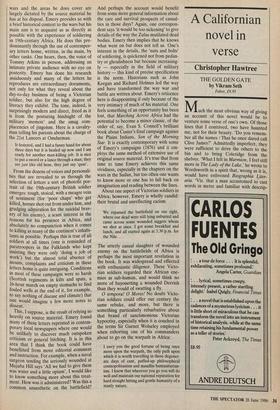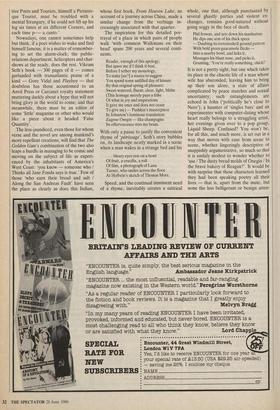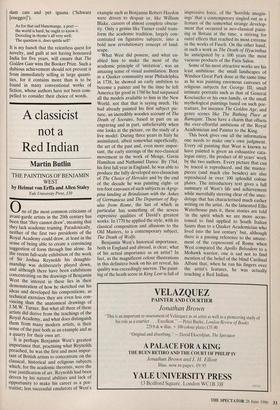A Californian novel in verse
Christopher Hawtree
THE GOLDEN GATE by Vikram Seth
Faber, f9.95
Much the most obvious way of giving an account of this novel would be to venture some verse of one's own. Of those lines that I contrived, two have haunted me, not for their beauty. 'Do you remem- ber all the names / That he once dared call Clive James?' Admittedly imperfect, they were sufficient to drive the others to the bin and to bring Coleridge from the shelves. 'What I felt in Marmion, I feel still more in The Lady of the Lake,' he wrote to Wordsworth in a spirit that, wrong as it is, would have enlivened Biographia Liter- aria. 'Viz. that a man accustomed to cast words in metre and familiar with descrip- tive Poets and Tourists, himself a Pictures- que Tourist, must be troubled with a mental Strangury, if he could not lift up his leg six times at six different Corners, and each time p— a canto.'
Nowadays, one cannot sometimes help but think, if a poet wishes to wake and find himself famous, it is a matter of remember- ing to set the alarm-clock; the public- relations department, helicopters and chat- shows at the ready, does the rest. Vikram Seth's book — 300 pages of it — comes garlanded with transatlantic praise of a kind — Gore Vidal and Playboy — that doubtless has those accustomed to an Anvil Press or Carcanet royalty statement muttering darkly about a hype that will not bring glory in the world to come; and that meanwhile, there must be an editor of some 'little' magazine or other who would like a piece about it headed 'False Quantity'.
The less-jaundiced, even those for whom verse and the novel are among mankind's more repellent creations, will find that The Golden Gate's combination of the two also leaps a hurdle in managing to be comic and moving on the subject of life as experi- enced by the inhabitants of America's West Coast: 'you know — someone who / Thinks all Jane Fonda says is true.' Few of those 'who earn their bread and salt / Along the San Andreas Fault' have seen the place as clearly as does this Indian, whose first book, From Heaven Lake, an account of a journey across China, made a similar change from the verbiage in- creasingly associated with that quarter.
The inspiration for this detailed por- trayal of a place in which pairs of people walk 'with common Walkmans on their head' spans 200 years and several conti- nents.
Reader, enough of this apology; But spare me if I think it best, Before I tether my monology, To stake [sic?] a stanza to suggest You spend some unfilled day of leisure By that original spring of pleasure: Sweet-watered, fluent, clear, light, blithe (This homage merely pays a tithe Of what in joy and inspirations It gave me once and does not cease To give me) — Pushkin's masterpiece In Johnston's luminous translation:
Eugene Onegin — like champagne
Its effervescence stirs my brain.
With only a pause to justify the convenient rhyme of `petrissage', Seth's story bubbles on, its landscape neatly marked in a scene when a man wakes in a strange bed and his . . . bleary eyes rest on a bowl Of fruit, a crucifix, a roll
Of film, a photograph of Lana Turner, who smiles across the floor At Holbein's sketch of Thomas More.
Speed, and the continual imminent need of a rhyme, inevitably creates a satirical whole, one that, although punctuated by several ghastly parties and violent ex- changes, remains good-natured without going soggy in the face of death.. .
Phil frowns, and sets down his manhattan. He dips one arm of his thick specs — Daubing its tortoiseshell ground pattern With bold green guacamole flecks— Into a nearby bowl, and licks it, Massages his blunt nose, and picks it, Grunting, 'You're really something, chick!'
It is not a pretty sight, but one which takes its place in the chaotic life of a man whose wife has absconded, leaving him to bring up their son alone, a state of affairs complicated by peace marches and sexual uncertainty; such entanglements are echoed in John (`politically he's close to Nero'), a haunter of 'singles bars' and an experimenter with computer-dating whose heart really belongs to a struggling artist, her evenings given over to a pop group, Liquid Sheep. Confused? You won't be, for all this, and much more, is set out in a way that moves with ease from scene to scene, whether lingeringly descriptive or snappishly argumentative, so much so that it is unduly modest to wonder whether to `use / The dusty bread molds of Onegin / In the brave bakery of Reagan?'. It would be with surprise that these characters learned they had been speaking poetry all their lives — that is, apart from the mute, but none the less belligerant or benign atten- dant cats and pet iguana (`Schwarz [enegger]').
As for that sad blancmange, a poet the world is hard; he ought to know it. Driveling in rhyme's all very well; The question is, does spittle sell?
It is my hunch that the relentless quest for novelty, and guilt at not having honoured India for five years, will ensure that The Golden Gate wins the Booker Prize. Such a dubious achievement should not prevent it from immediately selling in large quanti- ties, for it contains more than is to be found in many conventional works of fiction, whose authors have not been com- pelled to consider their choice of words.




















































 Previous page
Previous page